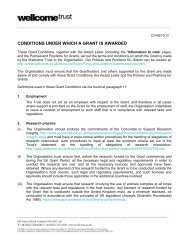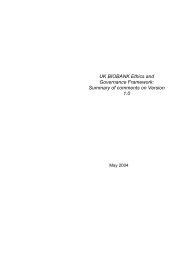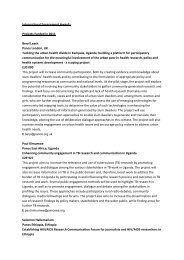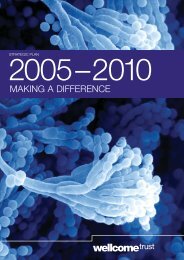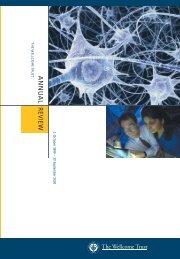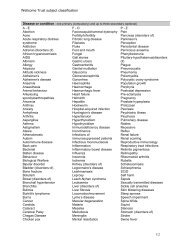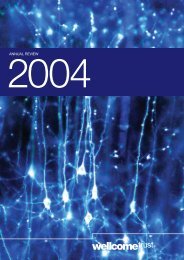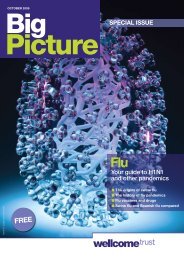You also want an ePaper? Increase the reach of your titles
YUMPU automatically turns print PDFs into web optimized ePapers that Google loves.
USING Knowledge | 23<br />
NEW FUNDING<br />
PUBLIC PROBES<br />
A SELECTION OF NOTABLE<br />
GRANTS AWARDED IN 2007/08.<br />
STRATEGIC TRANSLATION AWARD<br />
ANTIBIOTICS<br />
Mike Dawson (Novacta Biosystems) Optimising<br />
lantibiotic compounds specific for C. difficile.<br />
TRANSLATION AWARDS<br />
BIOMEDICAL ENGINEERING<br />
Chris Toumazou (Imperial College London)<br />
Development of a wireless implantable sensor<br />
to monitor pressure changes in heart chambers<br />
continuously after surgery for heart failure.<br />
4 5<br />
INFLUENZA<br />
Daniel Henderson (PaxVax, Inc.) An oral<br />
adenovirus-based vaccine against influenza<br />
for pandemic protection.<br />
some complex carbohydrates can be<br />
metabolised in the gut into short-chain<br />
fatty acids, which stimulate sodium and<br />
water uptake from the gut lumen. In<br />
particular, a type of high-amylose maize<br />
starch is partly broken down in the small<br />
intestine, releasing glucose, but an<br />
undigested ‘core’ survives to the large<br />
intestine, where it is metabolised to<br />
short-chain fatty acids.<br />
To test its potential, a clinical trial of an<br />
oral rehydration solution fortified with<br />
this high-amylose maize starch was run<br />
in Vellore. In people with severe<br />
diarrhoea, mainly due to cholera, the<br />
enhanced solution more than halved the<br />
duration of diarrhoea and significantly<br />
reduced faecal weight after the first 12<br />
hours of therapy.<br />
As well as providing physical benefits to<br />
individual patients, shortening the length<br />
of diarrhoea episodes would help to<br />
prevent the spread of disease and<br />
reduce hospitalisation time and costs.<br />
With climate change predicted to<br />
increase the burden of diarrhoeal<br />
disease still further, such benefits could<br />
have a huge impact worldwide.<br />
Ramakrishna BS et al. A randomized controlled trial of<br />
glucose versus amylase resistant starch hypo-osmolar<br />
oral rehydration solution for adult acute dehydrating<br />
diarrhea. PLoS ONE 2008;3(2):e1587.<br />
A Strategic Award will fund the<br />
development, and release into the<br />
public domain, of a set of chemical<br />
probes targeting key enzymes<br />
controlling gene activity.<br />
The Structural Genomics Consortium<br />
(SGC) has determined the structures of<br />
many proteins of medical interest<br />
(above). As well as benefiting basic<br />
research, such information can be used<br />
in drug development, aiding the design<br />
of small molecules that interfere with<br />
protein function. Structures are<br />
considered pre-competitive and<br />
structural data are freely released into the<br />
public domain.<br />
This new award, to Chas Bountra and<br />
colleagues at the SGC’s Oxford site,<br />
takes data release one step further.<br />
Chemical probes against three important<br />
classes of protein will be developed by<br />
an academia–industry partnership and<br />
made available for use without restriction.<br />
Academic researchers will benefit from<br />
new tools that can be used to investigate<br />
biological function; industry will have<br />
access to a set of materials and data that<br />
could form the basis of new therapeutics.<br />
The proteins targeted are all involved in<br />
epigenetic processes – modifications of<br />
DNA or associated proteins that affect<br />
gene activity. Epigenetic modification has<br />
been implicated in a wide range of<br />
biological processes and diseases.<br />
BIOMATERIALS<br />
Dr Morgan Alexander (University of Nottingham)<br />
Using high-throughput microarrays to identify<br />
polymers resistant to bacterial colonisation.<br />
ADJUVANT IDENTIFICATION AND<br />
DEVELOPMENT<br />
Professor Willem van Eden (University of<br />
Utrecht) and Professor Paul Lehner (University<br />
of Cambridge) Heat shock proteins as adjuvants.<br />
Professor Allan Mowat (University of Glasgow)<br />
The mode of action of immunostimulating<br />
complexes.<br />
James Brewer (University of Strathclyde)<br />
Antigen-presenting-cell and T-cell responses to<br />
two classes of adjuvant.<br />
Professor Paul Kaye (University of York) Impact<br />
of glycosylation of small-molecule immune<br />
enhancers.<br />
Professor Mark Baird (University College of<br />
Bangor) Synthetic mycolic acids as potential<br />
adjuvants.<br />
SEEDING DRUG DISCOVERY<br />
ANTIBIOTICS<br />
Kevin Judice (Achaogen, Inc.) Aminoglycosides<br />
for multidrug-resistant Gram-negative pathogens<br />
and MRSA.<br />
METABOLIC DISORDERS<br />
Professor Brian Walker (University of Edinburgh)<br />
Optimising lead compounds targeting<br />
11β-hydroxysteroid dehydrogenase for use in<br />
metabolic syndrome and cognitive decline in<br />
ageing.<br />
Details of all grants made can be found in<br />
Grants Awarded 2007/08, available on the<br />
<strong>Wellcome</strong> <strong>Trust</strong> website.



